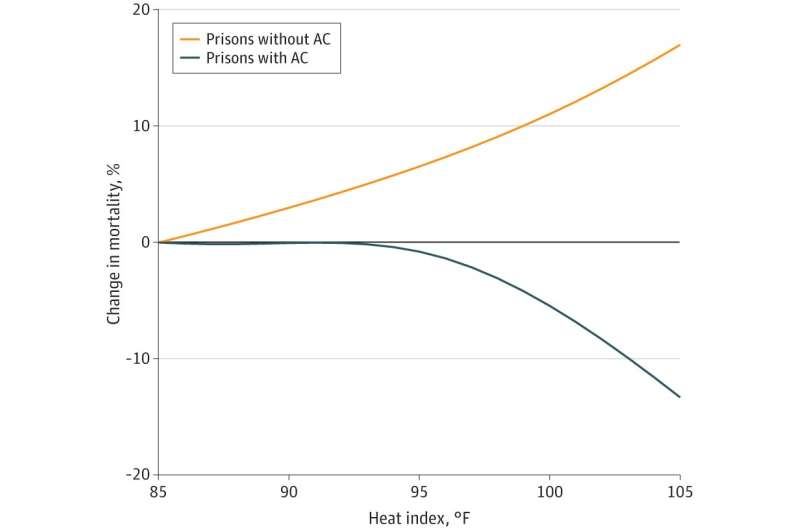Extreme temperatures take deadly toll on people in Texas prisons, study finds

The U.S. has the world's largest population of prisoners, and Texas holds more incarcerated people than any other state. As climate change continues to increase the severity, frequency and duration of heat waves, the approximately 160,000 individuals in Texas prisons—as well as the people who work in these settings—come under intense physical duress in prisons without climate controls, according to a new study led by researchers at Brown University's School of Public Health.
The study, published in JAMA Network Open on Wednesday, Nov. 2, examined the relationship between heat exposure and mortality risks in Texas prisons, focusing on how these risks vary between prisons with air conditioning and those without it.
The researchers analyzed data gathered between 2001 and 2019 showing that 271 people died due to extreme heat exposure during that timeframe.
Even a 1 degree increase above 85 degrees Fahrenheit can elevate the daily risk of dying by 0.7%, the researchers found.
The research team—which in addition to Brown also included scholars from Harvard University, Boston University and the organization Texas Prison Community Advocates—combined data from the U.S. Bureau of Justice Statistics on mortality in Texas prisons with temperature data from NASA and used a novel epidemiologic analysis to arrive at its findings. The team reported that approximately 13% of mortality during warm months may be attributable to extreme in Texas prison facilities without air conditioning.
It is important to note that while an average of 14 people died each year from heat-related causes in Texas prisons without air conditioning, not a single heat-related death occurred in climate-controlled prisons, said lead study author Julie Skarha, who received her Ph.D. in epidemiology from Brown in June 2022.
"The majority of Texas prisons do not have universal air conditioning," Skarha said. "And in these settings, we found a 30-fold increase in heat-related mortality when compared to estimates of heat-related mortality in the general U.S. population."
Study co-author Dr. David Dosa, an associate professor of medicine, and health services, policy and practice at Brown, pointed out that heat is often a silent killer.
"We have seen similar situations in nursing homes, where heat isn't reported on the death certificate," said Dosa, a practicing geriatrician with dual appointments at the Providence V.A. Medical Center and Rhode Island Hospital. "It's only after we run these analyses that we can determine how much of a role heat played in someone's death."
The findings, the researchers said, suggest that an air conditioning policy for Texas prisons may be an important part of protecting the health of people living and working in these facilities.
More information: Julianne Skarha et al, Provision of Air Conditioning and Heat-Related Mortality in Texas Prisons, JAMA Network Open (2022). DOI: 10.1001/jamanetworkopen.2022.39849


















